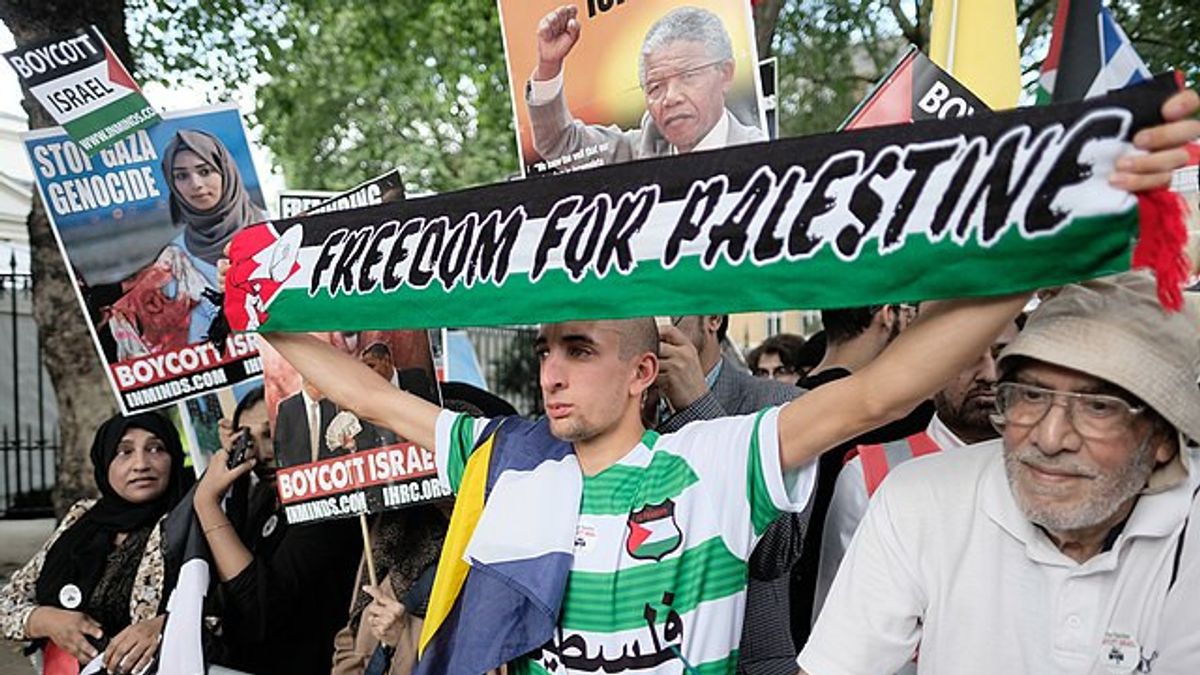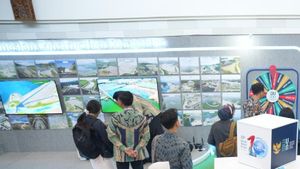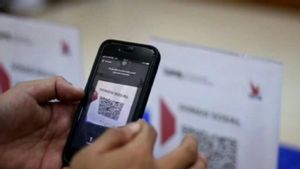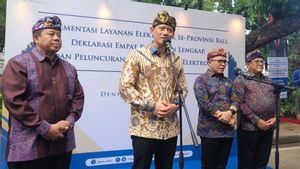
JAKARTA - The conflict between Israel's ethnic cleansing against Palestine has become the main focus of the international public sphere. The voices of supporters for the liberation of Palestine began to be heard. Even though it hasn't resonated. Not because of the low number of supporters, but there are attempts at "systematic silencing" that Israel is intensifying through social media platforms. This practice is also known as digital apartheid.
1984 Circa, Edward Said, a professor from Columbia University along with American-Palestinian academics issued an argument that rocked the international public. They concluded that Palestine was not given permission to speak.
More than 30 years later, in 2020 to be precise, Maha Nassar, an American-Palestinian Associate Professor from the University of Arizona, analyzed opinion articles published by two mainstream newspapers, The New York Times and The Washington Post, as well as two weekly magazines The New Republic and The Nation. Nassar studied writing after writing over the 50-year period from 1970-2019.
The results were not surprising. Nassar said: "Editorial councils and columnists seem too busy talking about Palestinians, often in derogatory and even racist ways - but somehow they don't feel the need to hear much from Palestinians."
Nassar's research presented by an academic with a PhD in Comparative Literacy from the University of Los Angeles, Omar Zahzah in Aljazeera, clearly shows that more than three decades after the publication of Said's essay, the "silencing" of Palestinian voices from mainstream media narratives in the West is an attempt to erase Palestinian humanity or cover up Israeli crimes against them continues. Unfortunately, after receiving the spotlight, this one-sided status quo has not subsided, it has worsened.

Meanwhile, in recent years social media has become a lifeline for many wanting to raise awareness about the struggles that mainstream media has silenced or undermined. But as Zahzah said, the social media giants are actively working to "censor" the Palestinian voice from their platforms, thereby extending the silencing to social media.
For example, in April, Zoom, Facebook and Youtube blocked an online academic event entitled "Whose Narrative? What Is Freedom of Opinion for Palestine?". The event was co-sponsored by the San Francisco State University's Arab and Muslim Ethnicities and Diasporas (AMED) study program.
The public discussion featured anti-apartheid activists from around the world, including Palestinian resistance icon Leila Khaled and former South African ANC military leader Ronnie Kasrils. But Zoom and other social media companies decided to block it.
They argued that Khaled was affiliated with the Front for the Liberation of Palestine (PFLP), a "US-designed terrorist organization". Then if the event continues, it could violate US law regarding the prohibition of material support for terrorism.
Injuring the academic pulpitJoin Censored Open Classroom 2.0, "Whose Narratives? What Free Speech for Palestine?" Friday, April 23, 2021, 12pm PST / 3pm EST / 10pm Palestine https://t.co/tndnjI35ck#whosenarratives #Palestine @uc_faculty @UCHRInews @AbdulhadiRabab @Cpt_John_Riley @ SFSU4Palestine @TeachingPalbu pic.twitter.com/RlBOM9xEbu
- AMED Studies (@AmedStudies) April 10, 2021
As many legal experts have repeatedly emphasized, the arguments put forward by the social media company are groundless. This incident not only ignores all relevant legal precedents and falsely accuses US law of violation, but also constitutes an attack on academic freedom.
Indeed, in an open letter to Zoom executives published in October last year, experts from Palestinian Law and other legal organizations emphasized that Zoom's censorship of AMED events constitutes a "dangerous assault on freedom of speech and academic freedom, and an abuse of your contract with the public university system. we."
They added that "[Zoom's] status as an essential public service does not give you veto power over classroom content and national public events," Zahzah wrote.
However, the warning was ignored. Social media companies such as Zoom and others completely ignore growing criticism of their biased policies and step up their efforts to silence Palestinian speech on their platforms.
After Zoom refused to load the public discussion event, now it's up to Facebook to take action. Mark Zuckerberg's platform not only removed publicity posts about the event, it also removed the AMED Studies program page from the platform, effectively removing the huge archive of talks, discussions and documents about the Palestinian liberation struggle and its links to freedom movements from around the world.
This material is deliberately shared and stored on Facebook so that academics, activists, organizers and the community at large can interact with them free of charge and without restriction. Facebook's removal of the AMED page clarifies the modus operandi of major Israeli-Palestinian social media companies: censoring material related to the Palestinian cause at Israel's request, and ignoring any criticism of this unlawful and unjust act.
From the aforementioned series of facts, perhaps many people thought that the action was due to the actions of pro-Israel actors. But in reality it is more than that. Zahzah said, actors who do have the power to whisper social media companies no longer need to bother to order this. The giant social media company itself, said Zahzah, has indeed rotted to its core.
The role of a pro-Israel actorIsrael and its allies are not just pressuring big tech companies to silence Palestinians from outside. The supervisory board of Facebook, an independent body tasked with weighing content decisions, includes Emi Palmor, the former Director General of the Israeli Ministry of Justice. Palmor once personally ran the Israeli Cyber Unit, which successfully lobbied to remove thousands of Palestinian content from Facebook.
It is plausible to regard Palmor's presence on the supervisory board as contributing to Facebook's anti-Palestinian actions. But the Tech Giants' silencing of Palestinian voices cannot be blamed on elite pro-Israeli actors alone.

Since its inception, social media companies have tilted toward the center of the US capitalist and imperialist structural power. They even partner with the US Department of Defense, coordinating big data surveillance and analysis. So, it's not just some powerful pro-Israel actors silencing social media companies to dissent, the industry itself is rotted to its core.
"Media organizations and social media companies can try to control and distort the narrative about Palestine, but they cannot hide the truth and silence the Palestinian call for justice forever," Zahzah said. Of course, this practice called digital apartheid cannot continue.
Digital aparheidAccording to Drone Emprit founder Ismail Fahmi, Israel is indeed intensifying total war. The war was carried out not only on land but also in cyberspace with digital apartheid.
According to Ismail, digital apartheid silences the voices and opinions of Palestinians both at home and abroad. One example is the blocking of public discussion on Zoom.
"At that time, the program was immediately blocked from Zoom, YouTube, Facebook. That's a clear example, even in the academic world there is silence," said Ismail when contacted by VOI.
About propaganda, for example, according to Ismail, it is clear how Israel attacks Hamas. "They mostly attack from the Hamas side. Hamas are terrorists. Like the name from the United States."
For this reason, so that in Indonesia this issue does not become confused, according to Ismail, understand the Israeli-Palestinian conflict in terms of human rights and justice. "Be like those outside (Indonesia). They see this is a matter of human rights. That Israel is unfair."
This pro-Palestinian movement is now worldwide. "There are many pro-Palestine ones. They definitely defend Palestine. That's a lot. Savepalestina, freepalestina, levepalestine," said Ismail.
BERNAS OthersThe English, Chinese, Japanese, Arabic, and French versions are automatically generated by the AI. So there may still be inaccuracies in translating, please always see Indonesian as our main language. (system supported by DigitalSiber.id)












